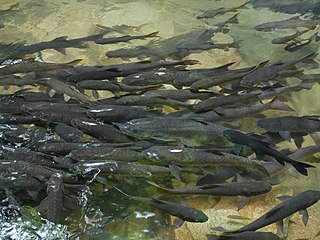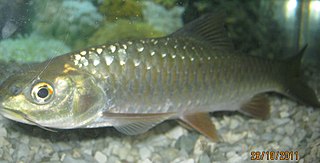
Mahseer is the common name used for the genera Tor, Neolissochilus, Naziritor and Parator in the family Cyprinidae (carps). The name is, however, more often restricted to members of the genus Tor. The range of these fish is from Vietnam in the east and China in the north, through Laos, Cambodia, Thailand, Malaysia, Brunei and Indonesia, and across southern Asia including the countries of India, Nepal, Bhutan and Bangladesh within the Indian Peninsula, plus Sri Lanka, Pakistan and Afghanistan. They are commercially important game fish, as well as highly esteemed food fish. Mahseer fetch high market price, and are potential candidate species for aquaculture. Several of the larger species have suffered severe declines, and are now considered threatened due to pollution, habitat loss, overfishing and increasing concern about the impacts of unregulated release of artificially bred stock of a very limited number of species.

Acrossocheilus is a genus of ray-finned fishes in the family Cyprinidae, native to freshwater in China, Taiwan, Laos, and Vietnam. They are fairly small, no more than 30 cm (1 ft) in standard length.

The big-scale pomfret also known as the long-finned bream, is a species of marine ray-finned fish, a pomfret of the family Bramidae. It is found in the Atlantic ocean, at depths down to 500 metres (1,600 ft). This species is widely distributed in the Pacific, from temperate zones throughout the tropics. They are commonly encountered around seamounts. This species reaches a length of up to 100 centimetres (39 in) SL. This species is of minor importance to the commercial fisheries industry. Bigscale pomfrets are common marketed bycatch species in pelagic longline fisheries targeting Yellowfin tuna or Bigeye tuna. The overall color is dark metallic gray to black. The flesh is white. The pelvic fins are short and black with a brilliant white tip. The caudal fin is a symmetrical crescent with rounded tips. It has a clear white rear edge, widest at the center of the tail, tapering away towards the fin tips. The pectoral fin is transparent gray with a clear white rear edge. From Ireland there are only two records of this fish. The last being from Co. Wicklow. In Hawaii this fish is called "monchong", along with the Lustrous pomfret.

The Deepbody bitterling or Itasenpara bitterling is a species of freshwater fish in the family of Cyprinidae. It is endemic to central and southern Japan. It grows to a maximum length of 8.0 cm.
Neolissochilus thienemanni, the ihan, is a species of ray-finned fish in the family Cyprinidae. It is found only in Lake Toba on the island of Sumatra, Indonesia.

Neolissochilus is a genus of fish in the family Cyprinidae native to freshwater habitats in Asia that are often grouped with the mahseers. The largest reach up to 1.2 m (3.9 ft) in length, but most species are much smaller.
Acanthocobitis pavonacea, also known as the spearfin loach, is a species of ray-finned fish belonging to the family Nemacheilidae, the stone loaches. This species is found in the Brahmaputra River of Assam. This is one of two species in the genus Acanthocobitis, alongside the type species, A. longipinnis. A. longipennis was treated as synonym of this species but in 2021 Maurice Kottelat and Waikhom Vishwanath published a paper that argued that A. longipennis was a valid species and that it was one of two species ofloach in the genus Acanthocobitis, alongside A. pavonacea, with the other species being classified in the genus Paracanthocobitis. This species is the type species of the genus Acanthocobitis.

Neolissochilus wynaadensis, the Wayanad mahseer, is a species of cyprinid fish. It is endemic to the Wyanad Plateau and its surroundings in the southern Western Ghats, India. It occurs in fast-flowing rivers and streams with rock substrates. This species can reach a length of 50 centimetres (20 in) TL. It is of minor importance to local commercial fisheries.

Neolissochilus soroides, commonly called the soro brook carp is a species of freshwater ray-finned fish belonging to the family Cyprinidae, the family which includes the carps, barbs and related fishes. This species ios found in Thaikand, Malaysia and Sumatra.
Neolissochilus subterraneus, commonly known as the cave brook carp, is a species of cyprinid cavefish that is endemic to the Tham Phra Wang Daeng cave within Thung Salaeng Luang National Park, Phitsanulok Province in Thailand. The genus name derives from the Greek words "neos", "lissos", and "cheilos"; they mean new, smooth, and lip respectively.
Neolissochilus benasi is a species of freshwater ray-finned fish belonging to the family Cyprinidae, the family which includes the carps, barbs and related fishes. This species is found in mountain streams and rivers in the bason of the Trà Khúc River in Quảng Ngãi province in Viet Nam and the Red River basin in Yunnan and northern Viet Nam. This species has a maximum published standard length of 17.4 cm (6.9 in)>
Neolissochilus blanci is a species of freshwater ray-finned fish belonging to the family Cyprinidae, the family which includes the carps, barbs and related fishes. This species is found in the Mekong, Chao Phraya and Mae Klong rivers in Thialnd, Laos, Cambodia and Viet Nam. It may also be found in Myanmar and southern China.
Neolissochilus blythii is a species of freshwater ray-finned fish belonging to the family Cyprinidae, the family which includes the carps, barbs and related fishes. This species is found in the Tenasserim Hills in southern Myanamar.
Neolissochilus dukai is a species of freshwater ray-finned fish belonging to the family Cyprinidae, the family which includes the carps, barbs and related fishes. This species has been recorded from the Ramganga in Uttar Pradesh and the Teesta River near Darjeeling.
Neolissochilus hendersoni is a species of cyprinid in the genus Neolissochilus. It lives in the Malay Peninsula and Thailand.

Neolissochilus hexagonolepis, the copper mahseer, chocolate mahseer or katli, is a species of freshwater ray-finned fish belonging to the family Cyprinidae, the family which includes the carps, barbs and related fishes. This species is found in Nepal, eastern India, Bangladesh, Myanmar, Thailand, Malaysia and Sumatra. It may also be present in China and Viet Nam, also the record sof this species from the easyetn part of its range is uncertain and reports may be misidentifications.

Neolissochilus hexastichus is a species of freshwater ray-finned fish belonging to the family Cyprinidae, the family which includes the carps, barbs and related fishes. It inhabits the Brahmaputra and Barak River drainages in Assam in India, and Nepal and possibly the Salween basin in Myanmar. and is considered "near threatened" on the IUCN Red List.
Neolissochilus nigrovittatus is a species of cyprinid in the genus Neolissochilus. It inhabits Myanmar and Thailand and has a maximum length of 13.0 centimetres (5.1 in).
Neolissochilus sumatranus is a species of cyprinid in the genus Neolissochilus. It inhabits Thailand and Sumatra, Indonesia and has a maximum length of 14.8 centimetres (5.8 in).
Neolissochilus vittatus is a species of cyprinid in the genus Neolissochilus. It inhabits the Salweenbasin in Myanmar and Thailand.








